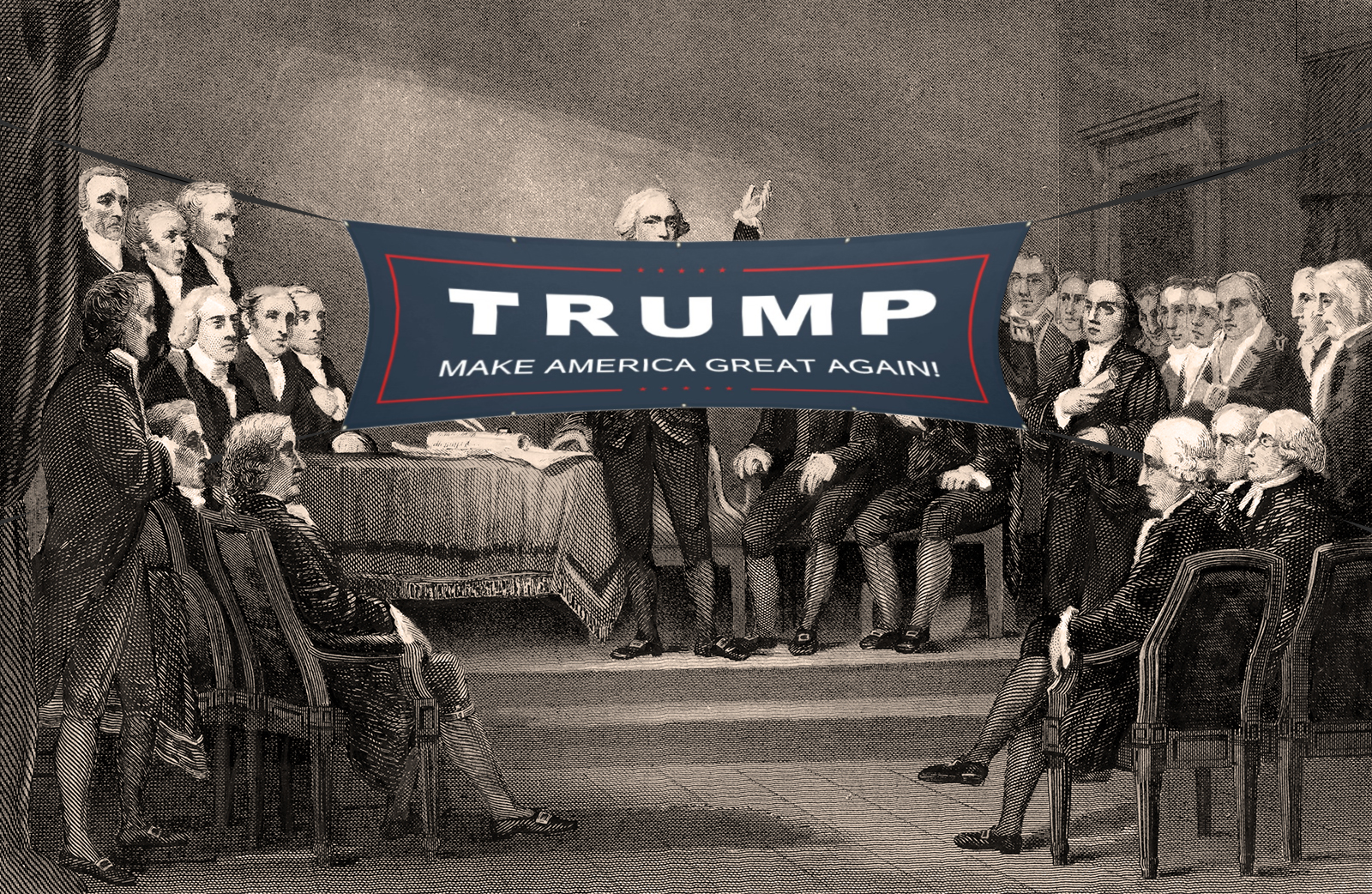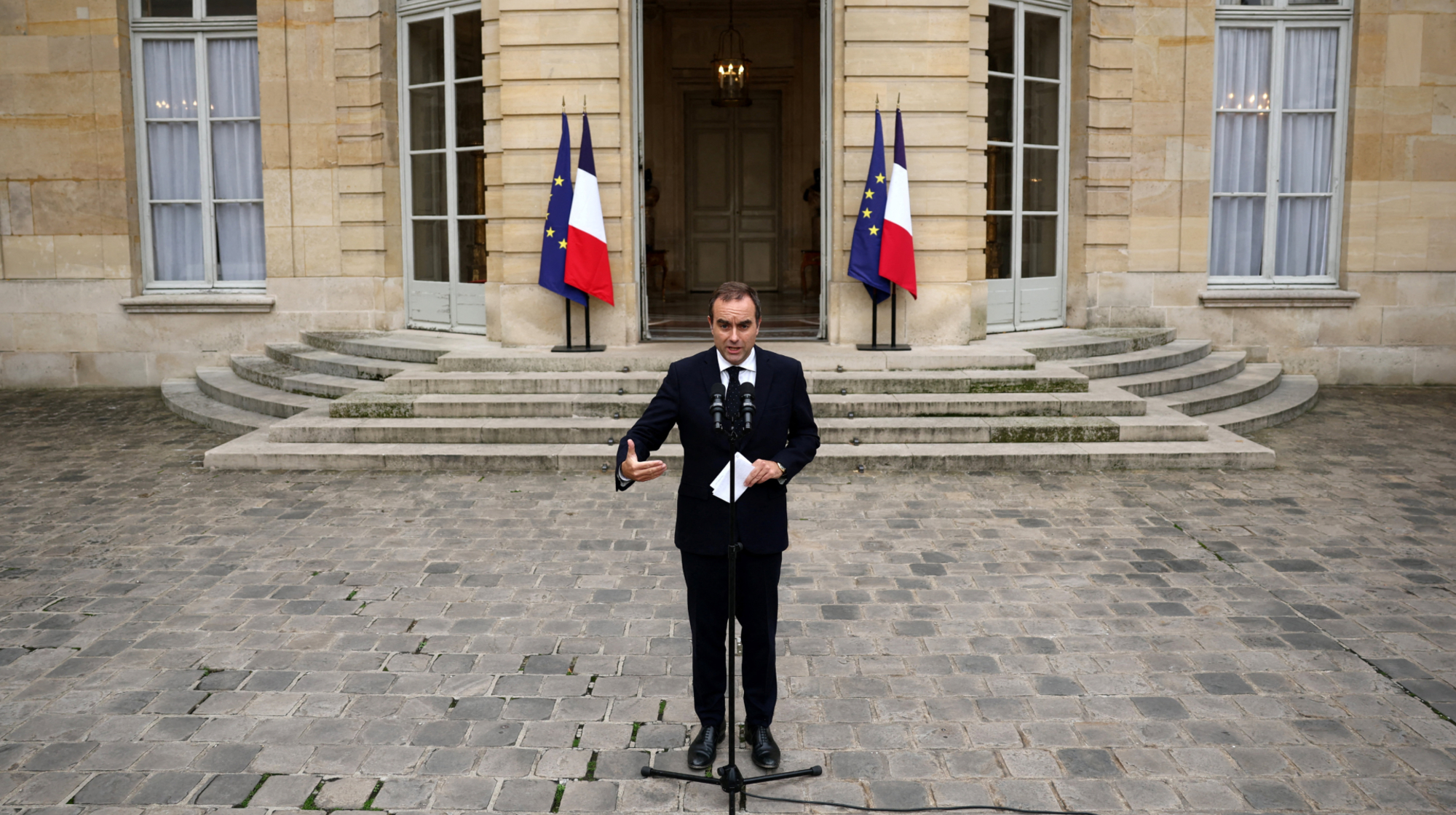6 ways Donald Trump wants to trample the Constitution
These Trump proposals aren't just illegal. They're blatantly unconstitutional.


Former Republican House Speaker Newt Gingrich, a yuge Trump booster, has been telling fellow Republicans that they should vote for Trump because he's the "only candidate" who would "uphold the Constitution." That's a laugh given that Trump is less wedded to the Constitution than he was to his first two wives. There is not an amendment that he has left unmolested. Consider just six of his many ridiculous proposals:
1. He wants to give cop killers the death penalty
Trump has declared himself the "law and order" candidate. To fulfill that promise, he pledged last December that one of the first things he'd do if elected is sign an executive order mandating the death penalty for cop killers.
The Week
Escape your echo chamber. Get the facts behind the news, plus analysis from multiple perspectives.

Sign up for The Week's Free Newsletters
From our morning news briefing to a weekly Good News Newsletter, get the best of The Week delivered directly to your inbox.
From our morning news briefing to a weekly Good News Newsletter, get the best of The Week delivered directly to your inbox.
There are many constitutional problems with this suggestion, starting with the fact that capital punishment is a state function. Forget executive mandates — even Congress cannot require it. Heck, Congress can't even force states to repeal the death penalty. The only authority that a president enjoys when it comes to sentencing, as The Atlantic's Matt Ford has noted, is rolling back sentences or pardoning people for federal crimes — not state crimes. The president can't impose any penalty. That is the job of judges and juries.
Any federal death penalty would eviscerate federalism and dilute the role of courts. Indeed, the Supreme Court ruled against a death penalty mandate in Woodson v. North Carolina, noting that it would be a violation of the Fifth Amendment's due process protections and 14th Amendment's due process and equal treatment protections. Why? Because judges and juries have to be able to take mitigating or aggravating circumstances into account when they hand out sentences.
For example, what if someone shot a cop accidentally? Or in self-defense? Should they be treated like the Dallas shooter who targeted cops? Conversely, suspending these considerations for cop killers but not killers of ordinary citizens would not only devalue the lives of cop killers, but also the victims of other killers, both of which would fly in the face of the Constitution's guarantee of equal treatment under the law.
2. He wants to strip some Latino Americans of their citizenship
A free daily email with the biggest news stories of the day – and the best features from TheWeek.com
Arguably, no group has been vilified and maligned by Trump more than Latinos. His demagogic accusations that Mexicans are "rapists and criminals" launched his candidacy. And he has made throwing out illegal immigrants already in the country and stanching the flow of new ones his core campaign promise.
To even find all 11 million undocumented immigrants would mean racial profiling on a grand scale, which would be constitutionally problematic. But along with them he also plans to send their American children — whom Trump derides as "anchor babies" — packing. This would require stripping them of their citizenship first — which the Constitution does not give the government the right to do, not even for proven terrorists. Not just that, Trump cannot withhold citizenship for future "anchor babies" without a constitutional amendment to scrap the 14th Amendment that extends citizenship rights to everyone born on American soil except for children of foreign diplomats and American Indians (who belong to sovereign tribes).
3. He wants to seize the assets of foreign nationals
His second immigration objective — stopping the flow of future illegal immigrants by building a border wall and forcing Mexico to pay for it — is even more ill conceived. In a memo fleshing out this plan, Trump says that as president he'd issue a mandate barring those in America unlawfully from transferring money abroad. This would stop remittances to Mexico instantly. Then he would use restoring the flow of this money as leverage to demand a one-time payment of $5 billion to $10 billion from Mexico.
As South Texas College of Law's Josh Blackman notes in National Review (not a publication known for its love for immigrants, incidentally), Trump's plan will require money-transfer companies such as Western Union to verify the identity and lawful presence in America of any individual who wants to remit money anywhere in the world. As a result, "billions of dollars already in American bank accounts held by foreign nationals would no longer be withdrawn," points out Blackman. "The money will effectively be seized and impounded within our borders by the federal government, without any due process of law or statutory authority."
This would be de facto nationalization of foreign assets of a magnitude not even attempted by Hugo Chavez-style Latin American potentates. But what's also troubling about Trump's "harebrained scheme," as Blackman calls it, is that it would usurp Congress' constitutional power over the regulation of foreign commerce. That he could find lawyers who would actually sign off on it is shocking — and these are the folks who Trump would use to pack up courts and the Justice Department, something that would do far more damage to an independent judiciary than anything Hillary Clinton has been able to come up with.
4. He wants to force Muslims to register in a database
Trump has played on fears about Islamic terrorism to float a slew of anti-Muslim proposals, including forcing Muslims to register with the government so that it could create a database and keep track of them — an appalling, daft, unworkable, and unconstitutional plan.
Trump has not fleshed out whether he would require only Muslim immigrants to register or also Muslim citizens. Either way, it would violate the First Amendment's free exercise clause because it targets individuals based on their religion. Worse, tracking individuals not because of their conduct but membership in a group is tantamount to guilt by association. It eviscerates the Fifth Amendment's guarantee of equal treatment under the law to every individual.
5. He wants to silence his media critics
Even as a businessman, Trump has sought to make it as costly as possible for his critics to exercise their free speech rights. He sued author Timothy O'Brien for $5 billion for suggesting that he wasn't a billionaire.
Over the last year, Trump has threatened to sue the online petition campaign demanding Macy's drop his clothing line after he called Mexicans "rapists and criminals." He sent Cruz a cease-and-desist letter threatening to sue for libel. Cruz's crime? Running an accurate ad showing Trump saying that he was pro-choice. Trump hilariously demanded that the Federal Communication Commission fine National Review editor Rich Lowry for commenting that Carly Fiorina had "cut his balls off" for making misogynistic statements.
Most troubling, however, is what he has threatened to do should he become president. He says he'd not only loosen libel laws to allow public officials to sue the press more easily, but also look for other ways to discipline critics. For example, he has threatened to go after Washington Post publisher Jeff Bezos, who founded Amazon, on anti-trust grounds for publishing "wrong" stories about him. But anti-trust laws were meant to thwart monopolies. If he can use this law to silence critics, it is beyond horrifying to imagine what havoc he'll wreak when he has the entire federal apparatus — the Internal Revenue Service, the Justice Department, the FCC — at his disposal.
6. He wants to crack down on judges who disagree with him
More ominous than how a President Trump would treat the media is what he'll do to a non-cooperative judiciary. He attacked Judge Gonzalo Curiel's Mexican heritage when the judge refused to issue a summary judgment throwing out a class action lawsuit alleging fraud by Trump University. Worse, he gleefully contemplated going after the judge if he were elected president in November.
Politicians criticizing court rulings that go against their policies is par for the course. But threatening to use the political apparatus against judges because they refuse to do his bidding on a personal matter is so beyond the pale that even Republican House Speaker Paul Ryan, who has tried to be diplomatic when commenting about Trump, rebuked him in no uncertain terms.
This is far from an exhaustive list of Trump's constitutional assaults. All of them betray Trump's contempt for federalism, separation of powers, checks and balances, and basic American political norms. They also show just how ruthless he will be in discrediting anyone or anything that comes in the way of his political ambitions. As far as he is concerned, the law is useful when it can be wielded as a weapon against opponents and a useless triviality worth ignoring when it can't.
Shikha Dalmia is a visiting fellow at the Mercatus Center at George Mason University studying the rise of populist authoritarianism. She is a Bloomberg View contributor and a columnist at the Washington Examiner, and she also writes regularly for The New York Times, USA Today, The Wall Street Journal, and numerous other publications. She considers herself to be a progressive libertarian and an agnostic with Buddhist longings and a Sufi soul.
-
 ‘The Taliban delivers yet another brutal blow’
‘The Taliban delivers yet another brutal blow’Instant Opinion Opinion, comment and editorials of the day
-
 Renewables top coal as Trump seeks reversal
Renewables top coal as Trump seeks reversalSpeed Read For the first time, renewable energy sources generated more power than coal, said a new report
-
 Prime minister shocks France with resignation
Prime minister shocks France with resignationSpeed Read French Prime Minister Sebastien Lecornu submitted his government’s resignation after less than a month in office
-
 Ghislaine Maxwell: angling for a Trump pardon
Ghislaine Maxwell: angling for a Trump pardonTalking Point Convicted sex trafficker's testimony could shed new light on president's links to Jeffrey Epstein
-
 The last words and final moments of 40 presidents
The last words and final moments of 40 presidentsThe Explainer Some are eloquent quotes worthy of the holders of the highest office in the nation, and others... aren't
-
 The JFK files: the truth at last?
The JFK files: the truth at last?In The Spotlight More than 64,000 previously classified documents relating the 1963 assassination of John F. Kennedy have been released by the Trump administration
-
 'Seriously, not literally': how should the world take Donald Trump?
'Seriously, not literally': how should the world take Donald Trump?Today's big question White House rhetoric and reality look likely to become increasingly blurred
-
 Will Trump's 'madman' strategy pay off?
Will Trump's 'madman' strategy pay off?Today's Big Question Incoming US president likes to seem unpredictable but, this time round, world leaders could be wise to his playbook
-
 Democrats vs. Republicans: which party are the billionaires backing?
Democrats vs. Republicans: which party are the billionaires backing?The Explainer Younger tech titans join 'boys' club throwing money and support' behind President Trump, while older plutocrats quietly rebuke new administration
-
 US election: where things stand with one week to go
US election: where things stand with one week to goThe Explainer Harris' lead in the polls has been narrowing in Trump's favour, but her campaign remains 'cautiously optimistic'
-
 Is Trump okay?
Is Trump okay?Today's Big Question Former president's mental fitness and alleged cognitive decline firmly back in the spotlight after 'bizarre' town hall event
